Python Fundamentals For Absolute Beginner Using Google Colab
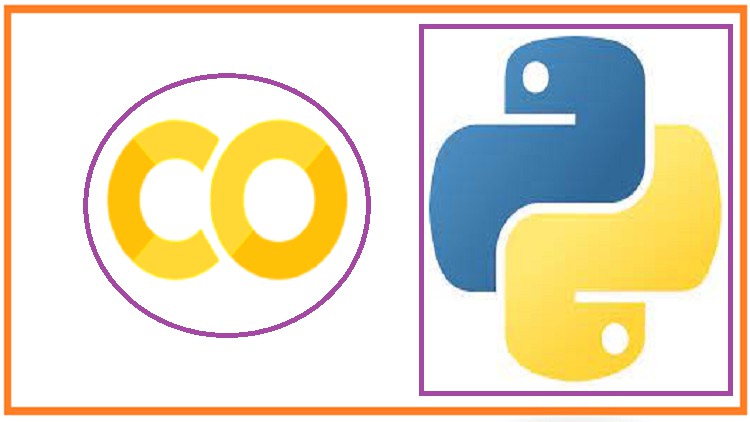
Why take this course?
🎓 Python Fundamentals For Absolute Beginner Using Google Colab 🚀
Embark on a comprehensive journey into the world of Python programming with our "Fundamental Course of Python Programming for Absolute beginners." This course, led by the knowledgeable Zeeshan Ahmad, is designed to be your stepping stone into the realm of coding. With Google Colab as your workspace, you'll explore and master the fundamental libraries such as NumPy, Matplotlib, Pandas, Seaborn, and more within the Python ecosystem. 🐍
Course Contents:
-
Introduction to Google Colab: Dive into the world of interactive coding with Google Colab, a powerful tool for running Python code in your browser without needing to install anything.
-
Operators in Python: Discover the different operators that help you perform various mathematical and logical computations effortlessly.
-
Arrays with Numpy: Learn how to handle large datasets efficiently using arrays with NumPy, and understand its applications in scientific computing.
-
Data Visualization with Matplotlib: Transform raw data into meaningful visualizations with Matplotlib, making it easier to interpret and present your findings.
-
Lists in Python: Understand how to create lists, manipulate them, and use them effectively in your programs.
-
Loops in Python: Master the use of
forandwhileloops to automate repetitive tasks and control program flow. -
Strings in Python: Explore the manipulation of text data and strings, including slicing, concatenation, and common string operations.
-
Dictionaries in Python: Learn how to create, access, and modify dictionaries for storing complex collections of data.
-
Seaborn Library: Enhance your data visualizations with Seaborn, a high-level interface for Matplotlib that provides a coherent library for drawing attractive and informative statistical graphics.
-
Pandas: Get to grips with Pandas, the leading data manipulation and analysis library for Python, to handle and analyze complex datasets with ease.
-
Functions: Create your own functions to reuse code and simplify complex problems.
-
Creating Classes in Python: Understand object-oriented programming by creating classes and instantiating objects, which allows you to structure larger projects more effectively.
-
Tuples: Learn when and how to use tuples for maintaining collections of items that should not be modified.
-
lambda(), map(), replace() and filter() functions: Discover the power of lambda functions and how to leverage
map,filter, and string replacement techniques to perform complex operations concisely. -
zip() and join(): Utilize these powerful functions to combine lists or iterables and convert them into a single list or string, respectively.
Who this course is for:
- Anyone who wants to learn Python from the ground up.
- Students and Researchers in Artificial Intelligence who are looking to expand their toolkit with Python.
- Those seeking to enhance their Python programming skills to solve more complex tasks.
- Developers aiming to transition to Python from other programming languages.
What you’ll learn:
- The operators used in Python and how they can simplify your coding tasks.
- How to create and use arrays in Python using NumPy, including its built-in functions for mathematical operations.
- To generate random numbers using NumPy, which is particularly useful in data simulation and machine learning.
- How to plot and visualize the data you collect using Matplotlib, making your findings more accessible.
- The art of creating lists and utilizing them effectively within Python scripts.
- How to navigate and manipulate strings in Python.
- The creation and application of dictionaries for organizing complex data structures.
- Data analysis and manipulation with the Seaborn and Pandas libraries, which are staples for any data scientist.
- Writing functions to encapsulate code for reusability and readability.
- Crafting classes in Python to build robust applications.
- The use of tuples for storing immutable collections of items.
- Understanding lambda functions and how they can be used to create small, one-off anonymous functions.
- Mastering
map,filter, and string replacement techniques to apply functions across multiple items and filter out relevant data. - Combining lists or iterables with
zipand converting collections into strings withjoin.
Get ready to embark on a journey of learning, discovery, and growth in the world of Python programming. Enroll now and transform your coding skills with our "Fundamental Course of Python Programming for Absolute beginners"! 🌟
Course Gallery
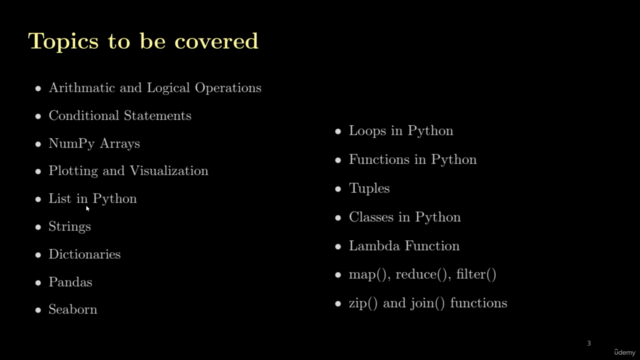
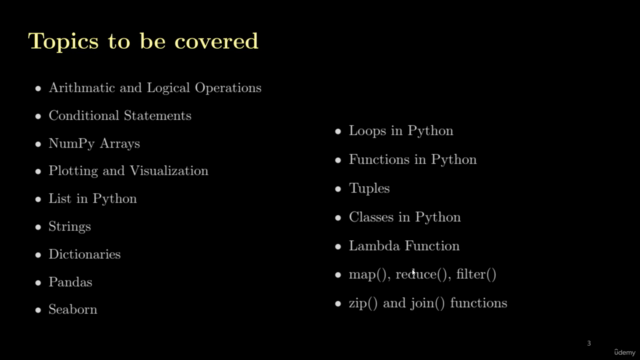
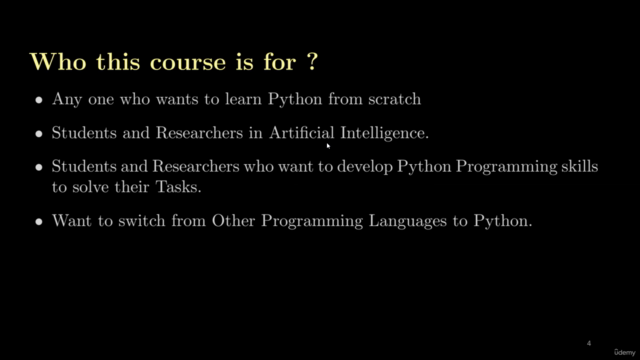
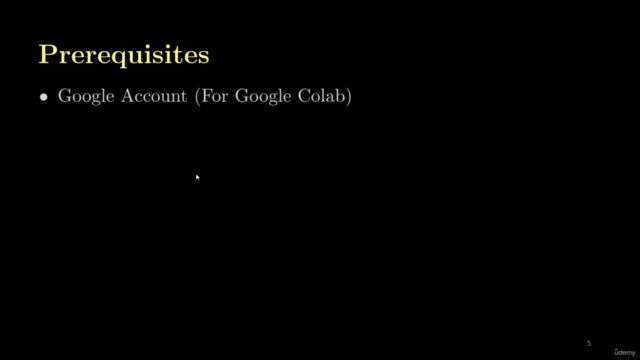
Loading charts...